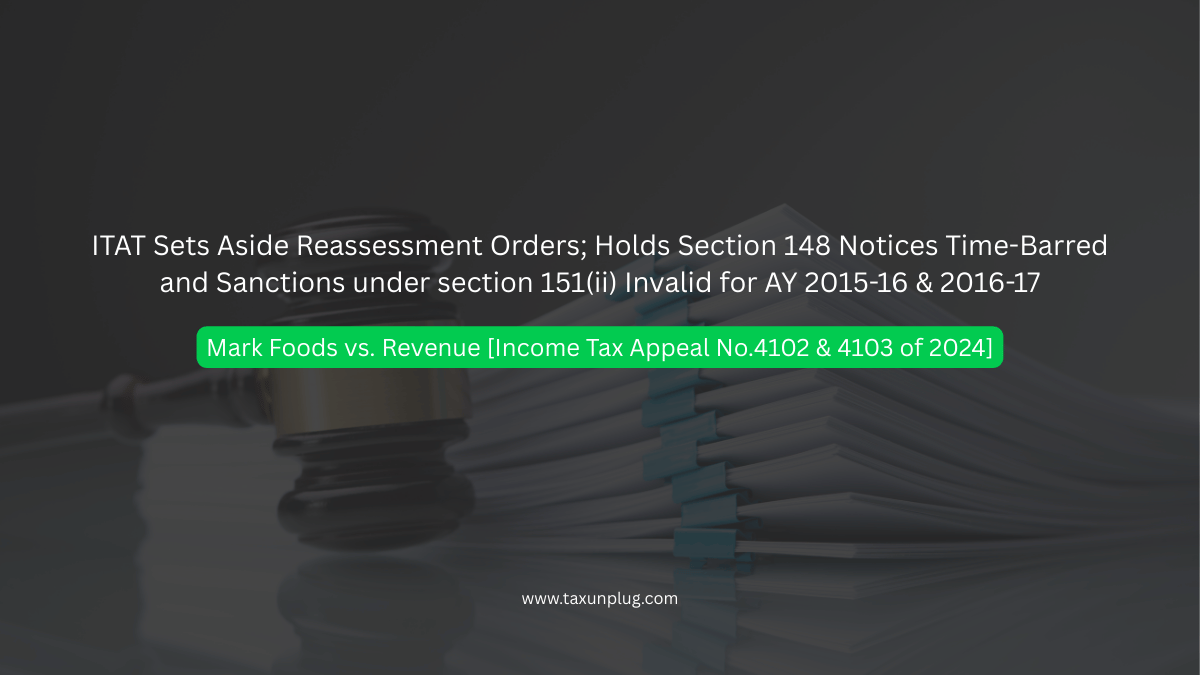Section 148 Time-Barred ITAT Ruling
Mark Foods vs. Revenue [Income Tax Appeal No.4102 & 4103 of 2024]
Background of the Case
The appellant filed appeal before ITAT Mumbai against reassessment orders for Assessment Years (AYs) 2015-16 and 2016-17. The Income Tax Department had initiated proceedings under Section 147 of the Income Tax Act, 1961, alleging that the company had engaged in bogus purchases and unexplained financial transactions. The Assessing Officer (AO) issued notices under Section 148, seeking to reopen previously concluded assessments. The appellant contested these notices on multiple grounds, including procedural irregularities, lack of proper approval, and violation of natural justice. The case gained significance due to its reliance on key judicial precedents, including the Supreme Court’s rulings in Union of India vs. Ashish Agarwal and Union of India vs. Rajeev Bansal, which dealt with the legality of reassessment proceedings under the amended tax regime.
Arguments by the Appellant
The appellant, raised several critical objections against the reassessment proceedings. For AY 2015-16, the appellant argued that the notice under Section 148, issued 15.07.2022, was time-barred, as the six-year limitation period had already expired on 31.03.2022. They relied on the Supreme Court’s decision in Rajeev Bansal, where the Revenue itself admitted that notices issued after 01.04.2021 for this assessment year were invalid. For AY 2016-17, the appellant contended that the sanction for reopening was granted by an unauthorized authority the Principal Commissioner of Income Tax instead of the higher-ranking Principal Chief Commissioner, as mandated under Section 151(ii) of the amended law.
Additionally, the appellant challenged the reassessment on grounds of violation of natural justice, arguing that they were denied the opportunity to cross-examine witnesses whose statements were relied upon by the AO. They also disputed the double taxation of the same amount, first as unexplained income under Section 68 and then as bogus purchases.
Respondent’s Response
The Revenue defended the reassessment proceedings, asserting that the notices were validly issued under the amended provisions of the Income Tax Act, read with the Taxation and Other Laws (Relaxation and Amendment of Certain Provisions) Act, 2020 (TOLA). The department argued that TOLA extended the timelines for initiating reassessment due to the COVID-19 pandemic, making the notices legally permissible. For AY 2016-17, the Revenue maintained that the approval granted by the Principal Commissioner was sufficient, as the new reassessment regime did not require a higher authority’s sanction in all cases. They further contended that the reassessment was based on credible evidence of bogus transactions and that the appellant’s objections were merely technical, lacking substantive merit.
The Revenue also emphasized that the denial of cross-examination did not vitiate the proceedings, as the AO had relied on independent material to form his belief about escaped income.
Court Findings and Decision
The ITAT bench of Mumbai ruled in favor of the appellant, quashing the reassessment proceedings for both AYs. For AY 2015-16, the Tribunal held that the notice under Section 148 was barred by limitation, following the Supreme Court’s decision in Rajeev Bansal, where the Revenue had conceded that notices issued after 01.04.2021 for this assessment year were invalid. The Tribunal emphasized that the six-year limitation period had expired before the notice was issued, rendering the reassessment void.
For AY 2016-17, the ITAT found that the sanction for reopening was invalid because it was granted by the Principal Commissioner instead of the Principal Chief Commissioner, as required under Section 151(ii) of the amended law. The Tribunal stressed that strict compliance with statutory procedures was mandatory, and the failure to obtain proper approval made the reassessment legally unsustainable.
Additionally, the ITAT noted that the AO had failed to provide the appellant with a fair opportunity to cross-examine witnesses, violating principles of natural justice. Consequently, the Tribunal allowed both appeals, setting aside the reassessment orders in their entirety.
To download official order, Click Here“
The site is for information purposes only and does not provide legal advice of any sort. Viewing this site, receipt of information contained on this site, or the transmission of information from or to this site does not constitute an attorney-client relationship. The information on this site is not intended to be a substitute for professional advice.”

